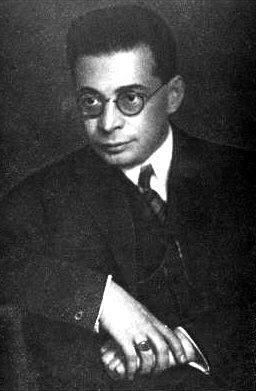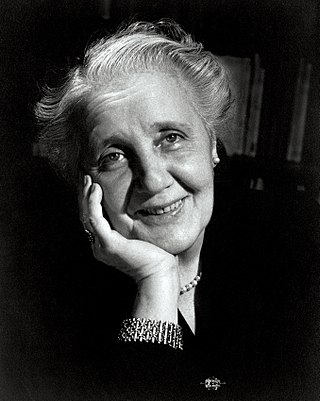Related Research Articles

Sigmund Freud was an Austrian neurologist and the founder of psychoanalysis, a clinical method for evaluating and treating pathologies seen as originating from conflicts in the psyche, through dialogue between patient and psychoanalyst, and the distinctive theory of mind and human agency derived from it.

Sándor Ferenczi was a Hungarian psychoanalyst, a key theorist of the psychoanalytic school and a close associate of Sigmund Freud.

Otto Rank was an Austrian psychoanalyst, writer, and philosopher. Born in Vienna, he was one of Sigmund Freud's closest colleagues for 20 years, a prolific writer on psychoanalytic themes, editor of the two leading analytic journals of the era, managing director of Freud's publishing house, and a creative theorist and therapist. In 1926, Rank left Vienna for Paris and, for the remainder of his life, led a successful career as a lecturer, writer, and therapist in France and the United States.

Melanie Klein was an Austrian-British author and psychoanalyst known for her work in child analysis. She was the primary figure in the development of object relations theory. Klein suggested that pre-verbal existential anxiety in infancy catalyzed the formation of the unconscious, which resulted in the unconscious splitting of the world into good and bad idealizations. In her theory, how the child resolves that split depends on the constitution of the child and the character of nurturing the child experiences. The quality of resolution can inform the presence, absence, and/or type of distresses a person experiences later in life.
In psychology and ethology, imprinting is any kind of phase-sensitive learning that is rapid and apparently independent of the consequences of behaviour. It was first used to describe situations in which an animal or person learns the characteristics of some stimulus, which is therefore said to be "imprinted" onto the subject. Imprinting is hypothesized to have a critical period.
In psychology, displacement is an unconscious defence mechanism whereby the mind substitutes either a new aim or a new object for things felt in their original form to be dangerous or unacceptable.
Anal eroticism, in psychoanalysis, is sensuous pleasure derived from anal sensations. Sigmund Freud, the founder of psychoanalysis, hypothesized that the anal stage of childhood psychosexual development was marked by the predominance of anal eroticism.

Totem and Taboo: Resemblances Between the Mental Lives of Savages and Neurotics, or Totem and Taboo: Some Points of Agreement between the Mental Lives of Savages and Neurotics, is a 1913 book by Sigmund Freud, the founder of psychoanalysis, in which the author applies his work to the fields of archaeology, anthropology, and the study of religion. It is a collection of four essays inspired by the work of Wilhelm Wundt and Carl Jung and first published in the journal Imago (1912–13): "The Horror of Incest", "Taboo and Emotional Ambivalence", "Animism, Magic and the Omnipotence of Thoughts", and "The Return of Totemism in Childhood".

Abraham Arden Brill was an Austrian-born psychiatrist who spent almost his entire adult life in the United States. He was the first psychoanalyst to practice in the United States and the first translator of Sigmund Freud into English.
Father complex in psychology is a complex—a group of unconscious associations, or strong unconscious impulses—which specifically pertains to the image or archetype of the father. These impulses may be either positive or negative.
Identification is a psychological process whereby the individual assimilates an aspect, property, or attribute of the other and is transformed wholly or partially by the model that other provides. It is by means of a series of identifications that the personality is constituted and specified. The roots of the concept can be found in Freud's writings. The three most prominent concepts of identification as described by Freud are: primary identification, narcissistic (secondary) identification and partial (secondary) identification.

In neo-Freudian psychoanalysis, the Electra complex, as proposed by Carl Jung in his Theory of Psychoanalysis, is a girl's psychosexual competition with her mother for possession of her father. In the course of her psychosexual development, the complex is the girl's phallic stage; a boy's analogous experience is the Oedipus complex. The Electra complex occurs in the third—phallic stage —of five psychosexual development stages: the oral, the anal, the phallic, the latent, and the genital—in which the source of libido pleasure is in a different erogenous zone of the infant's body.

The Oedipus complex is an idea in psychoanalytic theory. Sigmund Freud introduced the idea in The Interpretation of Dreams (1899), and coined the term in his paper A Special Type of Choice of Object made by Men (1910). The term refers to a son's sexual attitude towards his mother and concomitant hostility toward his father during the phallic stage of psychosexual development. The daughter's attitude of desire for her father and hostility toward her mother is referred to as the female Oedipus complex.
Identification with the Aggressor is one of the forms of identification conceptualized by psychoanalysis. Specifically, it is a defence mechanism that indicates taking the role of the aggressor and their functional attributes, or imitating their aggressive and behavioral modality, when a psychological trauma brings about the hopeless dilemma of being either a victim or an abuser. This theoretical construct is also defined as a process of coping with mental distress or as a particular case of zero-sum game.
Neutrality is an essential part of the analyst's attitude during treatment, developed as part of the non-directive, evenly suspended listening which Freud used to complement the patient's free association in the talking cure.
Sigmund Freud's views on religion are described in several of his books and essays. Freud considered God as a phantasy, based on the infantile need for a dominant father figure, with religion as a necessity in the development of early civilization to help restrain our violent impulses, that can now be discarded in favor of science and reason.

The Assault on Truth: Freud's Suppression of the Seduction Theory is a book by the former psychoanalyst Jeffrey Moussaieff Masson, in which the author argues that Sigmund Freud, the founder of psychoanalysis, deliberately suppressed his early hypothesis, known as the seduction theory, that hysteria is caused by sexual abuse during infancy, because he refused to believe that children are the victims of sexual violence and abuse within their own families. Masson reached this conclusion while he had access to several of Freud's unpublished letters as projects director of the Sigmund Freud Archives. The Assault on Truth was first published in 1984 by Farrar, Straus and Giroux; several revised editions have since been published.

Freud: A Life for Our Time is a 1988 biography of Sigmund Freud, the founder of psychoanalysis, by the historian Peter Gay. The book was first published in the United Kingdom by J. M. Dent & Sons Ltd. The book has been praised by some commentators and compared to the psychoanalyst Ernest Jones's The Life and Work of Sigmund Freud (1953–1957). However, it has been criticized by authors skeptical of psychoanalysis, who have accused Gay of lacking objectivity and of repeating incorrect claims about Freud's work.

Sigmund Freud is considered to be the founder of the psychodynamic approach to psychology, which looks to unconscious drives to explain human behavior. Freud believed that the mind is responsible for both conscious and unconscious decisions that it makes on the basis of psychological drives. The id, ego, and super-ego are three aspects of the mind Freud believed to comprise a person's personality. Freud believed people are "simply actors in the drama of [their] own minds, pushed by desire, pulled by coincidence. Underneath the surface, our personalities represent the power struggle going on deep within us".
Deferred obedience is a psychological phenomenon first articulated by Sigmund Freud, whereby a onetime rebel becomes subservient to the very rules and standards against which they had previously been rebelling.
References
- ↑ R. Lockwood, Cruelty to Animal and Interpersonal Violence (1998) p. 8
- ↑ Otto Fenichel, The Psychoanalytic Theory of Neurosis (1946) p. 481 and p. 612
- ↑ A. Tridon, Psychoanalysis and Behaviour (2013 [1921]) p. 69-73
- ↑ Quoted in P. Gay, Freud (1989) p. 335
- ↑ A Child's Favorite Song Recall